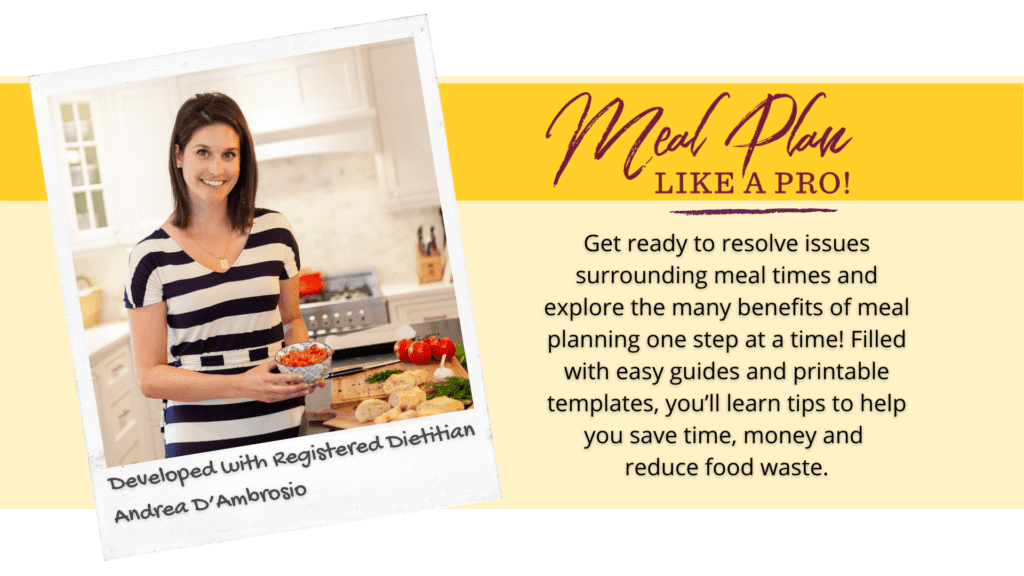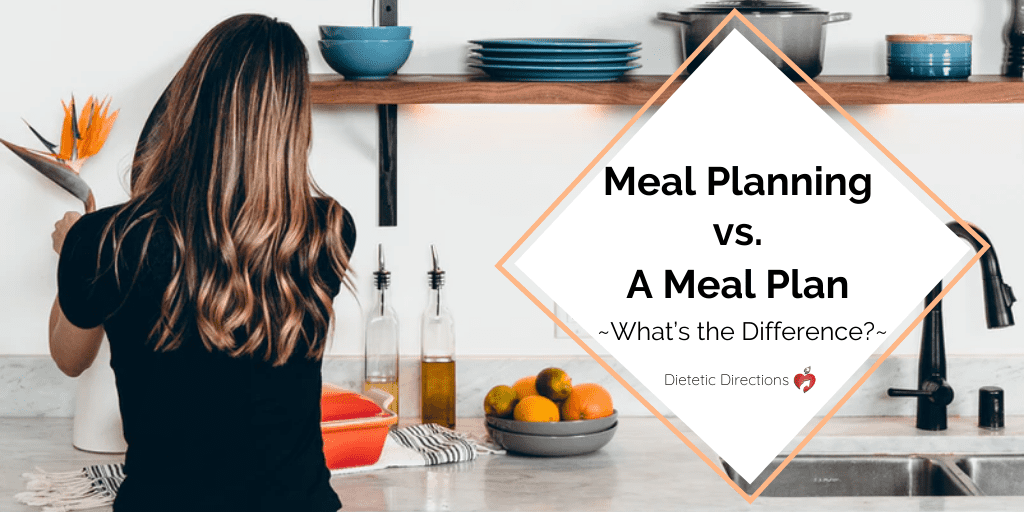
Meal Planning vs. A Meal Plan
~What’s the Difference?~
Many clients approach dietitians asking for a Meal Plan. Evidently, there’s something special about an incredibly specific template telling people what to eat day-in and day-out. I understand that. However, many dietitians scratch their heads thinking that having to follow a static meal directive is no way to live. After all, what do you do if you don’t feel like eating a tuna salad sandwich again on Tuesday? Similarly, research shows that actually meal planning is associated with improved dietary quality, whereas following a rigid Meal Plan can be an unsustainable long-term solution.

Consequently, if following a Meal Plan doesn’t work long-term, perhaps Meal Planning could be the solution you’re looking for. In today’s blog, I will differentiate between a Meal Plan and Meal Planning. I will also share questions to find out if Meal Planning could benefit you. As well, I’ll highlight the top five benefits of Meal Planning so you can achieve the same level of focus and comfort in knowing what you’re having for meals in advance.

Meal Plan vs. Meal Planning
A Meal Plan:
- Usually a fixed template telling you what to eat.
- Often repetitious and people tend to grow tired of a rigid meal plan!
- Doesn’t take into account your schedule for cooking, grocery sales, or foods to use up in your fridge.
- May not be created by a Registered Dietitian or with appropriate portions for your appetite and dietary requirements (perhaps Low FODMAP, gluten free, DASH Diet) .
- Following a severe calorie-restrictive Meal Plan can result in greater cravings for ‘less-healthy’ foods.
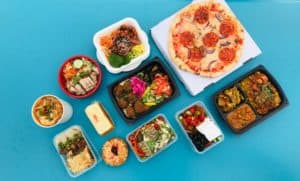
What’s with 1,200 Calorie Meal Plans?
You can google Meal Plan and you will find 727,000,000 results in 0.86 seconds. I understand the allure – it feels like security. Especially in the world of weight loss where people believe there’s a magic 1,200 calorie Meal Plan. Said who?! And how accurate is this Meal Plan calorie amount anyway? A 1,200 calorie meal plan is drastic and is the amount of food a toddler eats. Is this really what we’re aspiring towards? Similarly, what happens after a week or two of your 1,200 calorie Meal Plan when you get tired of having salted cucumbers for a snack?

Meal Plans: Always Question Sustainability!
Sustainability in lifestyle/dietary change is the key. Therefore, always ask yourself, how can you eat in a way that can be maintained LONG-TERM. Do not fall into the trap of believing there’s a quick-fix and easy solution. Because there isn’t. If you can’t sustain the dietary/lifestyle change, you won’t have long-term change. It’s really that simple.
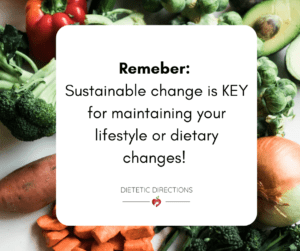
Whereas, Meal Planning:
Is the action of choosing your meals in advance based on:

Instead of seeking to be told what to eat with a Meal Plan, learning how to start Meal Planning is a way to gain skills and practice deciding your meals in advance. Consequently, setting you up for success. Therefore, Meal Planning leads to deciding your meals based on the above criteria and is followed by grocery shopping only for ingredients needed. Additionally, Meal Planning may involve family members, or consulting with blogs/recipes or friends to create your meal ideas.
Positive Spin on Meal Planning
What I prefer about Meal Planning is that it takes you a step away from passively being told what to eat and calorie-counting. Instead, it puts you in the driver’s seat of your own nutrition! You can choose what you enjoy and also assess the amount of time you have to cook or foods you want to use up in your fridge or freezer. Therefore, Meal Planning allows for planned leftovers and nights off cooking. Additionally, if you know how to start Meal Planning, you can create a weekly Meal Plan!
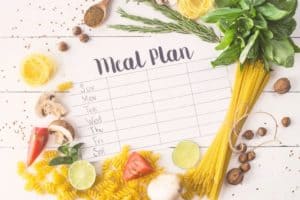
Meal Themes for Dinner Ideas!
If you are new to the idea of Meal Planning and like extra structure, try using tools for meal ideas. For example, check out our blog, 15 Favourite Meal Themes, to inspire your meals. This means every Tuesday can be Taco Tuesday and every Friday is Homemade Pizza night. Additionally, you can consult resources like Pinterest, cookbooks or Google recipes that are Quick and Easy or use ingredients you have on hand. Finally, be sure to ask friends or family members for ideas or recipes! For example, upon perusing meal ideas online, I saw a Hawaiian pork recipe that looks nice, so I can plan this into next week’s rotation by Meal Planning it!

Think of Meal Planning as a customized way of choosing your week’s meals. Having a plan in place allows you to have all the necessary ingredients and gives you time to focus on other things!
Still Not Sure if Meal Planning is for You?
Here are some questions to ask yourself:
Do you:
- Feel overwhelmed by the “what to make for dinner” question?
- Feel unprepared (with available groceries) to make dinner at home?
- Resort to take-out more than you’d like?
- Resent money spent eating out when cooking at home is cheaper?
- Believe your diet could be healthier if you cooked more?
- Make several trips to the grocery store in a week?
If you answered YES to ANY of the above, Meal Planning would benefit YOU!

Now that you know the difference between Meal Planning and following a rigid Meal Plan, I hope you find the option that works best for you! Remember, the art of Meal Planning is a skill that’s broken down step-by-step in this FREE Meal Plan Like a Pro resource. I wrote the content for this comprehensive resource and it’s available now online or by ordering print copies. Additionally, our dietitian team at Dietetic Directions is also well-versed on Meal Planning and can coach you on steps to start meal planning today!
As a big proponent of Meal Planning, I like to say, “healthy eating does not happen by accident.” We have to prioritize nutrition and plan (a little or a lot). Consequently, you will be set up for success.
Top 5 Benefits of Meal Planning!
Now, that we’ve differentiated a Meal Plan from Meal Planning, let’s highlight the Top Five benefits you can expect from Meal Planning (or deciding your meals in advance) for the busy week ahead. This will organize you into a realistic plan in no time.
1. Saves Time
Spending time up front Meal Planning will save you time later! When you’ve decided your meals in advance, you’ll save time thinking of what to make each and every night. Additionally, you’ll save time by having necessary ingredients already on hand instead of last minute grocery runs. Furthermore, by Meal Planning, you’re setting yourself up for success with a plan based on the time you have to cook (or not cook – leftovers are handy). This means dinner can be ready faster than take-out!

2. Spend Less $$
What many of our clients LOVE about Meal Planning is that it saves them money! This is something we can all get behind, especially with rising grocery costs. Similarly, cooking at home simply costs less than eating out. Also, with a plan in place, you can use up foods in your fridge instead of throwing them out (saving you $$). Therefore, by Meal Planning, we are benefiting from having a plan in place that leads to buying only what we need since you’ll have a tailored grocery list for your selected meals.
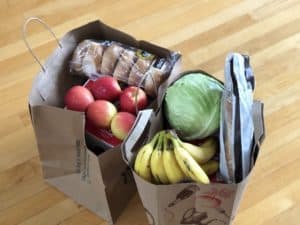
3. Improved Nutrition
Research shows that planning ahead and cooking at home more often equates to healthier meals with more veggies and reduced amounts of sodium, saturated fat and total calories. Additionally, if weight loss is an objective, cooking your own meals is a powerful tool to decrease caloric intake and increase intake of vitamins, minerals and fibre.

4. Less Stress
With Meal Planning, you don’t need to stress over what’s for dinner! Taking time up front will decrease future stress and decision making. After all, decision fatigue is a real thing! Having foods ready (or meals decided) can significantly improve the mental clutter from last-minute dinner decisions. Imagine, coming home from work and already having a plan in place, and one that’s realistic to your energy reserves and foods on hand. That spells LESS STRESS.
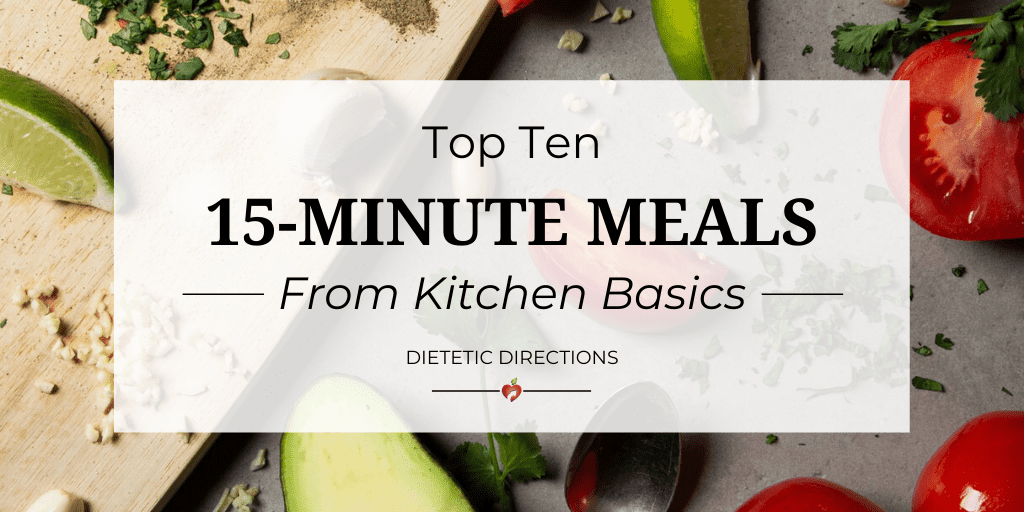
Also, when you Meal Plan, you can cook twice as much, which takes less than twice the time! This can lead to leftovers in fridge (and freezer) so you can plan nights off cooking. Making extra servings helps with creating new meals the next day using leftover ingredients. For example, you might make meatballs for a spaghetti dinner and use leftover meatballs on a submarine sandwich for lunch or the next night’s dinner.

5. It Gets Easier:
Finally, the last benefit of Meal Planning is that this skill gets easier over time. Think of it like flexing your Meal Planning muscle; it will get stronger! And when it does, you may find yourself increasing the variety of food choices and spending more or less time in the kitchen, depending on your preference for planned leftovers.

Bottom Line:
Meal Plans are quite different from Meal Planning. Whereas Meal Plans are often static and dictate what to eat and when, Meal Planning is the art of deciding your meals based on your schedule for cooking, your preferences, the foods you need to use up or leftovers you want to use. If you would like support in learning how to meal plan, be sure to contact us for a one-on-one dietitian coaching.

Now we know the Top 5 Benefits of Meal Planning -that it’ll save you time, save money, improve your nutrition, reduce dinner-time stress and above all, it will get easier the more you Meal Plan! I think you’re now probably all ready to get started! Stay tuned for our upcoming blog for Meal Planning ideas using our template. This is truly life-changing!

Now it’s your turn! What do you think about Meal Plans versus Meal Planning? Have you given Meal Planning a try yet?

